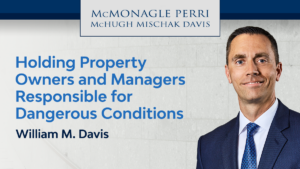 When property owners or managers invite or permit someone to be on their property, they have a legal duty to protect those guests from harm. But what if someone is hurt by a dangerous condition just off of the property line, or the property owner claims that it was not their duty to provide protection from a specific danger? That’s when it gets complicated.
When property owners or managers invite or permit someone to be on their property, they have a legal duty to protect those guests from harm. But what if someone is hurt by a dangerous condition just off of the property line, or the property owner claims that it was not their duty to provide protection from a specific danger? That’s when it gets complicated.
Let’s start with the legal responsibility for property owners or managers on their property. This is known as the “duty of care.” An owner or manager is legally obligated to exercise reasonable care to maintain a property. They must fix unsafe conditions or provide a warning about them to prevent slips, trips and falls.
Even if owners are unaware of safety issues, they could still be held liable. However, not all visitors are equally protected. A duty of care would apply for visitors who had permission to be on a property but not those who trespassed, for example. It also may not apply to visitors who venture into areas that are blocked off or closed. There is a time frame in which you have to file a lawsuit for being injured on someone’s property: in Pennsylvania, the statute of limitations is two years.
In the event that someone is hurt by a dangerous condition just off the property, or the property owner claims the duty of care does not apply, there is a way to hold them accountable, per a rule of law in Pennsylvania, grounded in the Restatement (Second) of Torts § 323:
“One who undertakes, gratuitously or for consideration, to render services to another, which he should recognize as necessary for the protection of the other’s person or things, is subject to liability to the other for physical harm resulting from his failure to exercise reasonable care to perform his undertaking, if:
(a) His failure to exercise such care increases the risk of such harm, or
(b) The harm is suffered because of the other’s reliance upon the undertaking.”
What this means is if a property owner or manager decides that it is necessary to put some sort of protections in place to prevent injury to people using, approaching or leaving their property, they can be held responsible if they act negligently in their attempt to protect people on or near the property.
For example, in Charney v. Reitz, a church was found to have owed a duty of care to congregants parking in a designated overflow lot and crossing a busy street, because they hired an employee to assist those patrons. In that case, the Pennsylvania Superior Court ruled that, since the church voluntarily undertook to provide services, they could be held liable for negligent performance and the subsequent death of a congregant.
It is important to note that, while this rule can apply to some “off-property” circumstances, there are other possible avenues to hold a property owner/manager responsible for a dangerous off-property condition, such as, fallen tree branches that hit and injure a passerby or overgrown tree roots that cause a slip and fall on the sidewalk. Property owners and managers also could be held responsible for manmade conditions, such as runoff water, mud or even construction gravel that accumulates onto a road or highway, and thus causes a crash.
These cases are often complex, and a plaintiff can benefit from an experienced law firm well versed in premises liability and personal injury. If you have been injured by a slip and fall or trip and fall in Pennsylvania, and you believe there is negligence involved, contact us today and get the skilled legal guidance you need.
